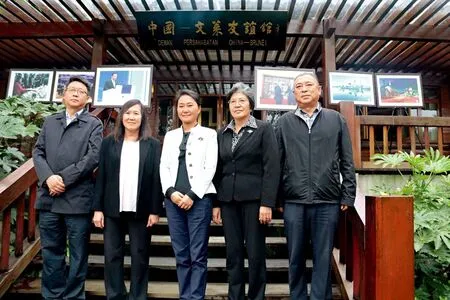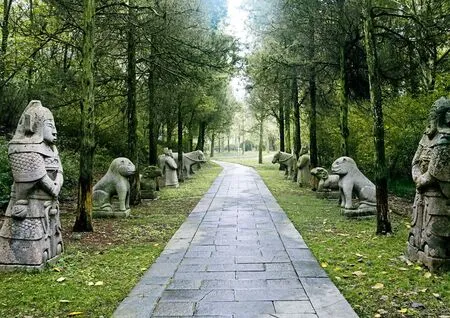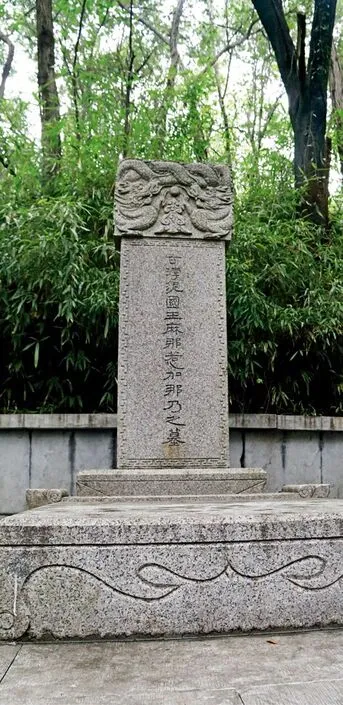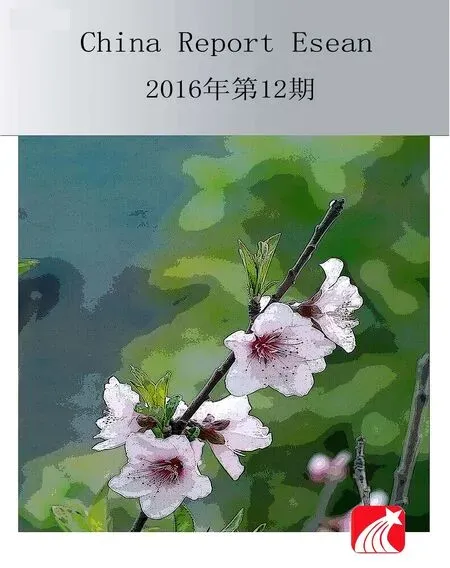Brunei Envoy Pays Tribute To the King of Boni
By Sary Jara, Sam Xia
Brunei Envoy Pays Tribute To the King of Boni
By Sary Jara, Sam Xia
About the authors:Sary Jara is a journalist formerly with theBrunei Times; Sam Xia is an editor atChina Report
ASEAN.
On the morning of Oct. 24, 2016, in the midst of the rain that had come with Typhoon Haima from the south, Brunei Ambassador to China Datin Paduka Magdalene Teo visited the Tomb of the King of Boni, located at the southern foothills of Tortoise Mountain, about 3 kilometers south of the ancient city of Nanjing, the capital of Southeast China’s Jiangsu Province.
The tomb, which signifies the historical relations that have existed between China and Brunei since 1408, is one of China’s Key Cultural Relic Units under State Protection (a title granted in 2001). At present, the tomb and its surroundings, collectively known as “The Tomb of the King of Boni Scenic Spot”, a Category 2A national tourist site, covers an area of 17 hectares, encompassing the Cultural Relic Protection Area, Cultural Relic Display Area, Brunei Feature and Style Park, and other areas.
The drizzling rain did not dim the excitement of the Bruneian diplomat in exploring the historical site as she proceeded to walk along the spirit way which is guarded with exotic pairs of stone sculptures on both sides. The stone sculptures of generals, tigers, goats, horses and grooms are believed to play the role of protectors, befitting of the King of high-rank (King of Boni) buried at the site.
Located at the end of the spirit way, the tomb consists of a round, central mound and a circular granite structure, which is surrounded by lush green trees. The tombstone reads,“The Tomb of the Deferent King of Boni”.
“We’re here to pay tribute to a pioneer of the 600-year-old Brunei-China friendship,” observed Teo.
Brunei Ambassador to China Datin Paduka Magdalene Teo visited the Tomb of the King of Boni to pay tribute to a pioneer of the 600-year-old Brunei-China friendship.

Brunei Ambassador to China Datin Paduka Magdalene Teo (second from left) with ACC Secretary General Yang Xiuping (second from right) and others at the Brunei Feature and Style Park.
Legend of the King of Boni
The King of Boni was Manarejiana (Sultan Abdul Majid Hassan), who is believed to have ruled Brunei before his passing in Nanjing.
In the third year of the Hongwu reign of the Ming Dynasty (1370), the emperor dispatched his officials to Boni on a diplomatic mission. On their return to China, the King of Boni sent his envoys along with the Chinese of ficials.
In the winter of the third year of the Yongle reign (1405), the Kingof Boni, who ascended the throne in 1402, sent his envoys to bring tribute to Emperor Yongle. In return, the Emperor granted an imperial mandate and seal to the King. The King was greatly pleased and decided to express his heartfelt thanks in person. Thus, he traveled to today’s Fujian Province by sea, along with his wife, sons and several other relatives, and was warmly welcomed by the local of ficials.
In August 1408, the King of Boni arrived in Nanjing, the capital of the Ming Dynasty, to attend the imperial court. He fell ill after staying in Nanjing for over a month. He died there in October in the same year when he was only 28 years old. In his testament, he showed a desire“to be buried in China”. Emperor Yongle suspended court for three days and buried him with imperial ceremony, conferred the posthumous title “Gongshun[respectful and submissive] King” to him and built a memorial temple to pay respects. The King’s tomb was known to the locals as “Huihui Fen” (Tomb of a Muslim).

Left: The spirit way to the Tomb of the King of Boni.

Right: The tombstone.
Story in Martial Arts Novel
The story of the King of Boni was in the opening chapter ofSword Stained with Royal Blood, a martial arts novel by Jin Yong (the pen name of Louis Cha), a Chinese novelist and essayist based in Hong Kong. Cha’s fiction, which is of thewuxia(martial arts and chivalry) genre, has a widespread following in Chinese-speaking areas, including Southeast Asia. His 15 works written between 1955 and 1972 earned him a reputation as one of the finestwuxiawriters ever. Cha’s works have been translated into English, French, Korean, Japanese, Vietnamese, Thai, Malay and Indonesian. He has many fans abroad, owing to the numerous adaptations of his works into films, television series, comics and video games.
In the opening chapter of the novel, Cha wrote: “In August of the sixth year of the Yongle reign (1408), Manarejiana, the King of Boni, a state on the island of Borneo in the southwest seas, paid a friendly visit to China, together with more than 150 people, including his wife, brothers, sisters, children and accompanying of ficials. They came with the tribute of borneol, phaius, hawksbill, rhinoceros horn and gold and silver treasures. Emperor Yongle was very pleased and invited the king to dine with him at Fengtianmen [in the Ming Forbidden City in Nanjing].”
The story is also recorded inThe History of the Ming. In return for his tribute, the Ming Emperor presented the King of Boni with “folding chairs, silverware, fan umbrellas, gold pommel horses and gold-embroidered brocade”.
Discovery in Brunei
As explained in the bookTarsilah Brunei (Brunei Genealogy: Early History and Islamic Development), the King of Boni, or Sultan Abdul Majid Hasan, is believed to have been the son of Sultan Muhammad Shah— the first Muslim ruler of Brunei.The author Pehin Orang Kaya Amar Diraja Dato Seri Utama Dr Hj Muhd Jamil Al-Sufri, a renowned expert in the field of Brunei history, believes that Sultan Abdul Majid Hasan might have ascended the throne aTher SultanMuhammad Shah passed away in 1402.
As Sultan Abdul Majid Hasan was not documented as the second king inSalasilah Raja-raja Brunei(the Genealogy of Brunei Kings/ Sultan), many Bruneians are not aware of his existence and history.There are limited resources and documentations of Sultan Abdul Majid Hasan in Brunei aside from China’s historical records and information from oral history. The main (and only) evidence found in Brunei that suggested him to be among the “unrecorded” kings in Brunei was the discovery of his daughter’s tombstone in the Muslim burial ground at the capital of Brunei.
Pehin Jamil wrote in the book that, “InSalasilah Raja-raja Brunei, it is stated that Sultan Muhammad Shah only had a princess named Puteri Ratna Dewi, but according to the tombstone found in Jalan Residency, Bandar Seri Begawan that belonged to Rokayah binti Sultan Abdul Majid Hasan ibnu Muhammad Shah Al-Sultan dated in 1422, which shows that Sultan Muhammad Shah also had a son named Sultan Abdul Majid Hasan...”
Having published more than 10 history books on Brunei from 1958 to the 1990s, alongside various written works in the fields of language, literature and culture, Pehin Jamil is an avid researcher and is active in the field of academia. He also headed the Brunei History Center in the past.
Currently, the center houses the limestone Turtle Tablet Pavilion called the Royal Bixi — a replica of the one exhibited at the Tomb of King Boni site in Nanjing — which was engraved with the record of diplomatic relations between Brunei and China in 1408.
The replica is part of the exhibition for the Brunei-China Relationship Gallery which was be officially launched at the National History Center on November 26, along with the new Ancient Brunei History and the Brunei Golden Age galleries.
World Heritage Site Application
Yu Qing, a vice governor of Yuhuatai District of Nanjing, hosted Ambassador Teo’s visit. She said China is in the process of applying for the Tomb of King of Boni to become a Maritime Silk Road World Heritage Site.
“We are hoping that our Brunei counterparts can give their support and assistance for us to achieve this goal,” Yu said. “We need more photos and materials from Brunei for us to showcase Brunei to visitors here and attract tourists to this historical place.”
Yang Xiuping, Secretary General of the ASEAN-China Center (ACC), who was with Ambassador Teo for the visit, said efficient communication between government agencies in China and Brunei is needed to achieve the goal of making the tomb a Maritime Silk Road World Heritage Site.
The municipal government expressed high hopes that the site will be accepted as a World Heritage Site before marking the 610th anniversary of historical relations between Brunei and China.
“We are also hoping that His Majesty Sultan Haji Hassanal Bolkiah Mu’izzaddin Waddaulah, the Sultan and Yang Di-Pertuan of Brunei Darussalam, will visit the tomb himself before the 610th anniversary to signify the milestones of the countries’relations,” said the vice governor.
Yu said His Royal Highness Prince Mohamed Bolkiah and HRH Princess Hjh Masna visited the tomb in 1993 and 2006 respectively.
Since the tomb was rediscovered in 1958, the Nanjing government has carried out a series of renovations to the tombtone, the spirit way and the tomb itself. There have also been ef f orts to rebuild the memorial archway, the spirit pavilion and the stone platform.
According to the tourist information board at the site, the rehabilitation project for the site is currently in its first phase, in which the public can only access the 8-hectare Cultural Relic Protection Area.
Meanwhile, the second phase will focus on the completion of the Cultural Relic Display Area and Brunei Feature and Style Park, for which construction has already begun.
To further promote the role that the Tomb of King Boni played in the friendship between the two countries, the municipal government of Nanjing also set up the Chinese-Bruneian History & Culture Center in May 2016.
A delegation from the center visited Brunei in September 2016, where they revealed that the Brunei Feature and Style Park will exhibit the latest photos and information on Brunei when it is completed and has a tentative launch date of June 2017.
Inviting the Bruneians to witness the grand opening ceremony of the park, Center Director Yang Xinhua said that such initiatives in setting up the park are intended to promote understanding among local Chinese of Brunei, while bolstering cultural and educational exchanges as well as tourism cooperation between the two peoples.
China is in the process of applying for the Tomb of King of Boni to become a Maritime Silk Road World Heritage Site before the 610th anniversary of historical relations between Brunei and China.
- China Report Asean的其它文章
- Should We Stay or Should We Go? What multinationals should look for as they decide to keep production in China or move it to ASEAN countries
- Tourism Set to Drive Indonesia’s Economy Forward
- Lost in Vietnam: A Co-Production Love Comedy
- Cycling in Hainan A New Avenue For Tourism
- Bambang Susantono: Infrastructure Development Requires Efforts From All Sides
- Singapore and China: Building on the Past and Opening a Way Toward the Future Exclusive interview with Singaporean Ambassador to China Stanley Loh

